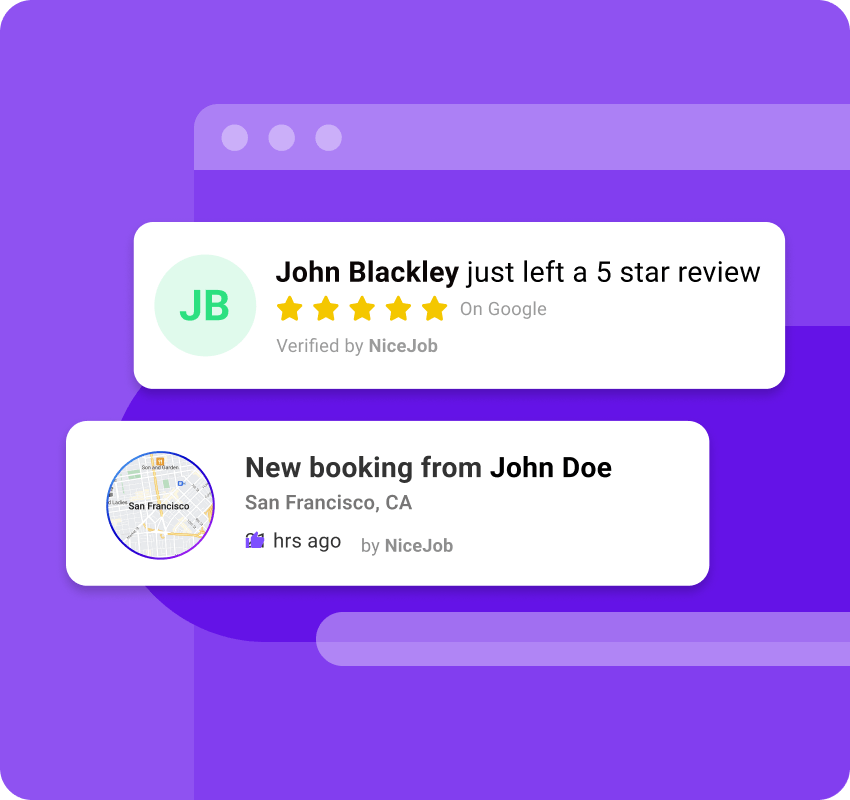Benefits and Tips of Using Google Analytics for Your Small Business
We love Google Analytics. And we believe that your small business will love it too.
Google Analytics is the perfect tool for you as a small business owner to see how their website performs and learn what website improvements to make to increase conversions and sales!
In a nutshell, with the data in Google Analytics, you’ll have the proper research you need to build a lead-generation website.
But with so much information available in Google Analytics and the sheer scope of it, it’s easy for small business owners to feel intimidated by it and not even know where to start.
That’s why we’ve got your back. And it doesn’t matter if you’re just starting out or already have some experience with Google Analytics for your small business.
Our Google Analytics guide for small businesses has something for everyone. It is full of suggestions, insights and actionable ideas to help your website and small business grow!
In this article, we cover the basics of Google Analytics for small businesses, its benefits and how you can get started.
We also talk about some tips to use Google Analytics effectively to grow the traffic on your website.
So, the question remains, are you ready for your crash-course intro to Google Analytics? Let’s find out!
What Is Google Analytics?
Google Analytics is a free service offered by Google that helps you analyze your website traffic. It is a tool that shows you how visitors use your website.
For your small business, the website is the central hub of your digital presence.
You put so much effort into planning digital marketing campaigns via your website, it becomes vital to track the results of your time spent and Google Analytics allows you to do just that!
How Do Small Businesses Use Google Analytics?
For most SMBs, online reputation is the key to getting more business.
If you own a small business and want more customers, leads and sales, you need to manage your reputation online and that starts with your website.
Google Analytics is a great way to drive growth and build your reputation because it offers insights into user behavior to help you customize your website for your ideal customer.
For example, small businesses use Google Analytics to segment their website traffic by different audience types. You can use this data to measure the success of your marketing campaigns.
As they say, information is power, and the more information at your disposal, the more you can use your website to establish your reputation as the top service provider in your region!
Is Google Analytics Good for Small Business?
Google Analytics is great for small businesses for several reasons.
Lots of alternatives to Google Analytics are good for larger companies, but often you’ll have to pay for them.
Google Analytics is also simple to install, as we’ll show below. Just sign up with your Google account and paste one line of code onto your website and you’re set!
If there's one knock against Google Analytics for small businesses, it’s that the large amount of data in it might overwhelm you.
But by focusing on a few key features and metrics, you can hone in on what’s important for you.
And there are other reasons for why Google Analytics is good for small businesses.
If you use Google Local Services, advertisements exclusively designed for small businesses, you can easily see how leads from that channel interact with your website.
Plus, you can connect your Analytics account to Google My Business by tracking website clicks, which is a great example of a Google My Business optimization.
With this connection, you can compare how well your website does for leads who find your business via your Google My Business account versus other types of leads.
Using the features of Google Analytics, you can sell more, spend less and get to know your current and future customers better.
Benefits of Google Analytics for Small Business Owners
Now that you know what Google Analytics is, let’s examine how Google Analytics can benefit your small business.
- Understand your Target Audience
- Understand the Behavior of Website Visitors
- Run Targeted Campaigns
- Free to Use!
1. Understand Your Target Audience
As part of setting up your website and marketing campaigns, you would’ve given considerable thought to who your target audience is.
Once you’ve used the right set of keywords to attract your target audience, you need to retain them and double-down on targeting them. Google Analytics will help you do just that.
It will provide your small business with crucial information about the audience that visits your website.
Information like gender, age, location and interests can help you improve your future marketing campaigns and cater to your target audience’s needs.
For example, if you run a landscaping business that does high-end landscape designs, you might guess that high-salaried homeowners in nearby towns will be your bread and butter.
With Google Analytics, for example, you can analyze curated audience segments to not only confirm those assumptions but also see what other kinds of online interests your visitors have.
2. Understand the Behavior of Website Visitors
At the heart of Google Analytics is its ability to help you track user activities on your website, such as details about landing pages, pages visited, exit pages and other important data.
With this information, you can enhance the overall user experience and cater to the specific needs of your website users.
For instance, say you have a form on a Contact Us page that potential customers can browse to from your homepage.
How does that form perform for users who go straight to that page vs. other users or for users who spend a certain amount of time on your website vs. those who spend very little?
With Google Analytics, answers to such questions are at your fingertips.
3. Run Targeted Campaigns
Google Analytics provides great insights about your company’s target audience and how they interact with your website.
Using this information, you can create targeted campaigns that are designed specifically to attract your target audience.
For instance, maybe you notice that one particular audience contacts your small business via your website more than others.
You can transfer that audience list to a Google Ads account to target people with the same interests in the same city and with similar demographic characteristics.
Or maybe you update the messaging around the conversion touchpoint on your webpage to appeal to that audience specifically.
In other words, Google Analytics data can help you as a small business owner make more informed decisions about your marketing campaigns and your website
4. Free to Use!
Google Analytics is a great service to use for numerous reasons. But you know what the best part is? Its price tag: $0.
Over 50 million small business websites around the world use Google Analytics. If you’re not using it, you’re missing out. We definitely suggest setting it up right now!
But, how do you set up Google Analytics? Let’s dive into that next.
How to Set Up a Google Analytics Account
At first, Google Analytics can seem complicated and scary. Don’t fret, since you can set up an account within just a few moments and get started in a breeze.
Let’s take a look at the steps to set up a Google Analytics account for a small business website:
- Go to the Google Analytics homepage and click “Start for free.”
- Sign in to Google Analytics. Here, you can either create a new username for your small business or use another active Google account like Gmail to log in.
- Enter details like your small business website's name and URL.
- In your website’s content management system, add the Analytics tracking code that you've just generated. Analytics will give you instructions on how to install it on your website if you’re unfamiliar.
You can also add different users to your Google Analytics account in the “User Management Section.” Adding people like your web developer and/or a marketing employee can be helpful.
Google Analytics Tips for Small Businesses
Ok, setting up a Google Analytics account was the easy part. But it’s in the application stage where most small business owners slip up and make common Google Analytics mistakes.
To get to the insights that will actually help you make a difference, you will have to know the basics of how to use certain features in Google Analytics.
Want to know how you can truly leverage Google Analytics for your small business? Here are some tips for you!
Use Custom Segments
There’s probably no better tool in Google Analytics that will allow you to dig deeper into your users’ behavior than audience segments.
A segment is a subset of your data. You can also think of it as a small piece of the whole pie or as a slice of cheese rather than the whole wheel.
Google Analytics will provide you with a lot of data. But it is up to you to make the most of it, and creating custom segments will help you do just that.
How?
By dividing the data into small, digestible chunks of information.
For example, using Google Analytics, you can slice and dice the data into small segments like:
- Users who interacted with your website for more than two minutes.
- High-value users who provided their contact information.
- Users who viewed a key page or a particular type of page.
Set Intelligence Events
As a small business owner, you probably handle many aspects of your business. You’re busy and you don’t really have the time to crunch Google Analytics data every day.
Setting intelligence events is the perfect feature for you. With them, you can create automatic custom alerts in Google Analytics that will tip you off about something unusual on the website.
For example, an event like a sudden dip in your traffic is something that should require your immediate attention. Is something wrong? Is there a sudden change in user behavior to know?
With the help of intelligence events, you will get an alert immediately and this will allow you to fix the problem at the earliest opportunity.
Assign Monetary Values to Your Goals
Goals are specific actions that you, as a small business owner, would like your users to complete on your website.
An easy example would be someone who clicks on a “Call Us” button to phone your business for an appointment.
We believe that it is important to give monetary values to goals because the primary goal of a business website is to generate revenue.
How much is a phone call worth to your business? Once you determine the conversion rate of your goal and reference it against your average revenue per customer, you’ve got your answer.
From there, for instance, you can instruct algorithms in paid-ad accounts like Google Ads to prioritize conversion metrics with profitable values to help you increase sales.
You can only truly measure the effectiveness of a marketing campaign by analyzing how it affects your bottom line, for better or worse.
In Google Analytics, you can set up goals from the admin section. There, you will find a field for defining the value of each goal.
Leverage Google Analytics to Grow Your Small Business
In this article, we've given you all the information that you need to get started with Google Analytics and scale your local business.
However, this is just a brief intro about the potential advantages of using Google Analytics.
If you’re looking for an easy way to make the most out of tools like Google Analytics, and get the traffic you deserve, then check out Convert.
Convert helps small businesses achieve the highest possible conversion rates by guaranteeing a 10% increase in the amount of website visitors who contact your business.
Now it’s time for your small business to reap the benefits of Google Analytics!
Ready to Stand Out from Local Competitors?
Discover the power of effortless review generation and watch your business soar to the top of local rankings.
Get 4x More Reviews




